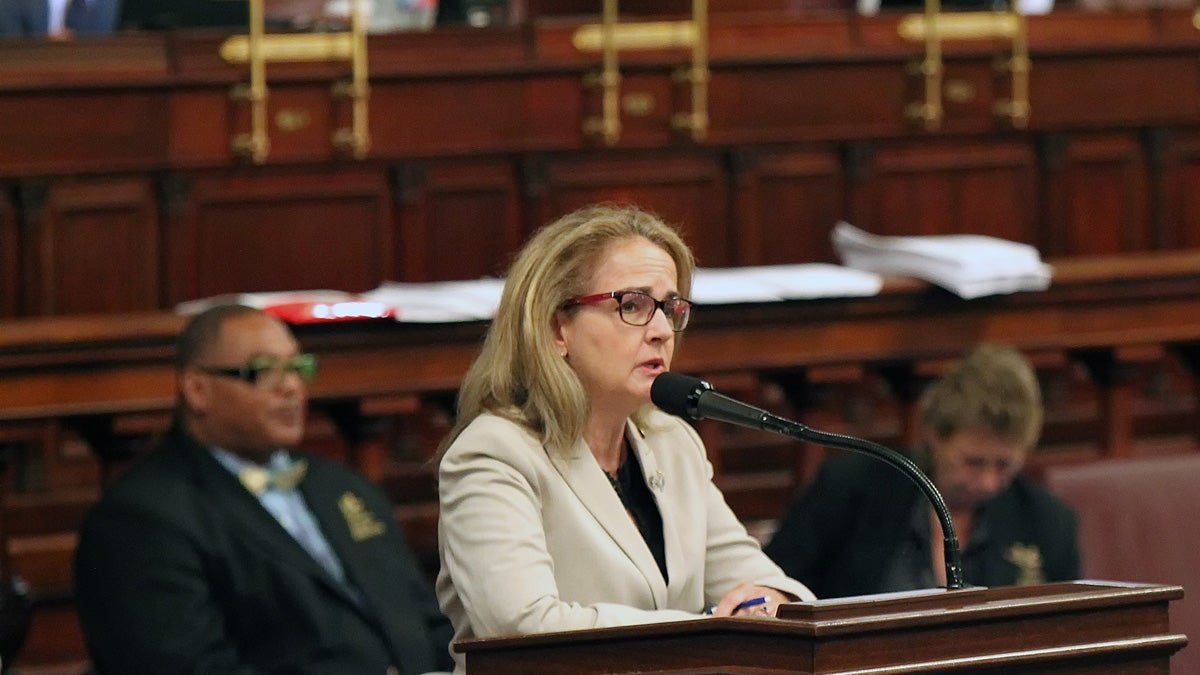Path of service that began at 18 leads Madeleine Dean to halls of Congress
Morning Edition host Jennifer Lynn talks with Congresswoman-elect Madeleine Dean about how she's getting ready for freshman year in Congress.
Listen 6:32
Madeleine Dean graduated from Abington High School – and at age 18 she was elected to serve as a local committee-person. She said that marked the beginning of her career in public service. (AP Photo/Chris Knight)
Next week, newly elected congressional members will be sworn into the 116th Congress in Washington, D.C. Among them will be Democrat Madeleine Dean, who, at the age of 18, was elected a committee person in her hometown of Glenside, Pennsylvania. A lawyer and educator, she has served as an Abington Township commissioner and, most recently, a state representative in Harrisburg.
Dean will represent the recently redrawn 4th Congressional District which includes Montgomery County and parts of Berks County. WHYY Morning Edition host Jennifer Lynn talked with Dean about her journey to Capitol Hill.
—
Good morning, and congratulations on your victory.
Well, thank you very much.
You’ve come a long way from that 18-year-old who was voted in as a committee person. What do you think of your trajectory when you look back at that to where you are now?
Well, it is funny to think that the seeds were planted that early, by a simple request by my friend’s parents when I was in high school. They said, ‘We think you should run for committee person.’ And I said, ‘Sure.’ Not knowing even what a committee person was. And I found a little brochure that I went door to door within my little precinct. And it’s surprising how similar my thoughts are. I wanted to serve my community. I worried that I’m such a busy person that how would I get it all done. Imagine, at 18 I thought I was so busy. But the seeds were definitely planted then.
You grew up in a big family.
Yes.
Youngest of seven.
Yes.
How do you see that as a basis for working in a frenetic environment like D.C. or anywhere?
Oh, you’ve met my family?
I can only imagine.
It was a very fun upbringing, even though it was a chaotic time. It was the 1960s when I was a little girl. So I had a brother in the Vietnam War, and I had another brother in the Navy serving stateside and a robust family with raucous dinners and lots of quizzes at the dinnertime table. So I think, in many ways, being part of a large interested engaged family really did prepare me for public service.
Does it prepare for bipartisanship?
Yes, that’s very true. In a family like mine, we are diverse. Diverse in our interests, diverse in our ideals, even though we all grew up under the same roof. We make sure to try to find a compromise.
Tell us about the orientation period. What is it like and what do you learn in a very short amount of time before your swearing in?
Well, I was really pleased and surprised, frankly, with our two weeks of orientation in D.C. And then we had three [days] at Harvard, the Kennedy School. We had seminar after seminar on global affairs, on economic affairs, on international affairs, on poverty, on crime, on criminal justice reform, on the environment — you name it — with top-level speakers. Much of it was bipartisan, but everything from the nuts and bolts of “let’s set up your office” to some of the committee assignments you might get and some of the resources that are available to you as a member of Congress.
Well, what’s it like to set up your office?
Oh, it’s been fun. They do an office lottery. I did very well. They say it’s not a bad idea to do some little skit to take it a little lighter. We did the floss dance. I don’t know if you know that.
The floss dance?
The floss dance. Yes.
Is there a video of this we can get our hands on?
I kept asking my chief of staff … I think he’s buried the video. We did that and we got number 17 of 85. And one of the things that I wanted was an office in the Cannon Office Building. It’s the old beaux-arts building with high ceilings, and I wanted something really accessible. So we’re first-floor Cannon.
You go by Mad.
I do. Keeps it simple.
Instead of Madeleine. Mad, on Election Day in Pennsylvania, we went from having no women in Congress to sending four women to D.C. You’ve been labeled this group of four, The Fab Four. Fab Four sisters Mary Gay Scanlon, Susan Wild, Chrissy Houlahan, and you — all Democrats. What relationships with each other have the four of you built since the election or perhaps on the campaign trail?
On the campaign trail is where it all began. To go from no women in Congress (from Pennsylvania), which most people didn’t even understand — that we’d have 18 congressmen, two senators … 20 federal representatives, and not one woman, none, since Allyson Schwartz four years earlier.
Who’s from your county.
That’s right. She’s my friend, my mentor. So the four of us got together, and I’m of the mind that a rising tide lifts all boats. So we got to commiserate. We went out once in a while to have a margarita, to say how bad was your week, or how good was your week. We also got to bounce ideas off one another. Ideas of staffing, of legislative priorities. We did some joint fundraising events. I believe that relationship will continue.
Well, what do you think the Democratic Party should be sounding like in 2019? Is it likely to be a moderate voice of the Conor Lambs of the party or maybe a more progressive voice of the Alexandria Ocasio-Cortezes out there?
I hope we are measured and smart and thoughtful, informed by both those kinds of voices. I taught writing and rhetoric at La Salle University, and I always told my students, “Prize your words. Value your words. Don’t say things that are histrionic or untrue and make your arguments those ways.” So I hope the Democratic Caucus, the Democratic Party, is smart and thoughtful with the important measures of progressive politics.
Your office aide told me when he came in, Tim, he said words and facts matter to her a lot.
Yeah, they really do. I remember one time I said something on the floor of the House in an argument that I made and I got one fact wrong. I felt so bad about that. I literally went and corrected the record. And everybody around me was saying, “Mad, it’s so small, it doesn’t matter.”
Facts and words do matter. And, so, if I get something wrong, I go back, I’ll apologize, I’ll correct it. And I always demanded of my team, “Please make sure I have the facts, because I don’t want to be out on a limb making an argument that really is not supported.”
Scale of one to 10, 10 is the worst. How burned up do you feel when our president is using certain words or maybe evading facts, not using facts?
It almost leaves me speechless. It is so counterintuitive to everything that I stand for, everything I think good governance should stand for. The president of Harvard spoke to this issue in some opening remarks that he offered to our group at the Kennedy School. They are concerned, and they are having conversations with their students about rhetoric and about the use of facts, that we cannot allow our Democratic policies and our Democratic institutions to be debased by a fact-free world that this administration seems to live in.
—
Madeleine Dean begins her time in Congress, representing Pennsylvania’s 4th Congressional District, next week. She’ll soon learn what her committee assignment will be. She’s put in for Appropriations, Judiciary, Transportation, and Infrastructure, and Oversight and Government Reform.
—
Editor’s note: This transcript has been updated to reflect that the training for new Congress members at Harvard was three days long.
WHYY is your source for fact-based, in-depth journalism and information. As a nonprofit organization, we rely on financial support from readers like you. Please give today.





